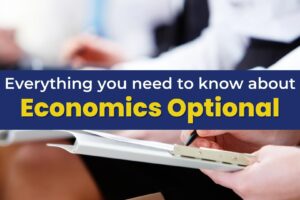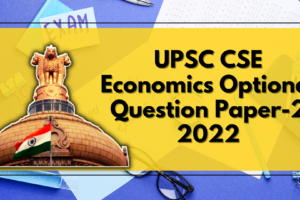Economics Optional Strategy & Syllabus
As you may know, UPSC offers Economics optional as a subject in the civil services main test. Students seem to be cracking this exam with excellent scores in economics, proving that it has a higher success rate than other optional subjects. Aspirants from a math or engineering background tend to go for economics because they can excel in it easily with their pre-acquired knowledge. Toppers like Gurav Agarwal, the first-place finisher in the Civil Service Exam of 2013, testify that economics as an optional can yield good results with some hard work and practice.
The optional you choose has a substantial impact on your score in the UPSC CSE mains, which is why it is essential to make sure that you have mastered your optional subject. While your interest in the subject can be the primary ground for choosing an optional, material availability is also something to keep in mind while making such an important decision. A thorough understanding of the syllabus, well-planned strategy and consistent practices can help you make it with flying colours in exams like UPSC CSE.
Here are some pros and cons of taking economics as your optional
PROS:
-It’s an understandable subject that follows logic and reason.
-As was already mentioned, economics is a technological subject that is just as contemporary as other mainstream optionals.
-Overlaps and covers roughly 50–60% of the GS Paper 3 syllabus.
-Covers roughly 20–30 points in UPSC Preliminary GS Paper 1.
-For reference, there is plenty of study material available in the market.
CONS:
-It can be a little challenging to finish the entire curriculum and have a thorough comprehension without much economics knowledge
-Since there will likely be many graphs used in the preparation, one must be proficient with them. But after getting the hang of it, a pupil may quickly earn points.
-A solid understanding of mathematics can be very helpful. Consequently, this serves as a warning.
-Despite the market’s abundance of study materials, one should be ready to do their own independent study by reading several books.
Economics optional syllabus
Advanced Micro Economics
- Marshallian and Walrasiam Approaches to Price determination.
- Alternative Distribution Theories → Ricardo, Kaldor, Kaleeki.
- Markets Structure → Monopolistic Competition, Duopoly, Oligopoly.
- Modern Welfare Criteria → Pareto Hicks & Scitovsky, Arrow’s Impossibility Theorem, A.K. Sen’s Social Welfare Function.
Advanced Macro Economics
- Approaches to Employment Income and Interest Rate determination
- Classical, Keynes (IS-LM) curve
- Neo classical synthesis and New classical
- Theories of Interest Rate determination and Interest Rate Structure.
Money – Banking and Finance
- Demand for and Supply of Money
- Money Multiplier Quantity Theory of Money (Fisher, Pique and Friedman)
- Keyne’s Theory on Demand for Money
- Goals and Instruments of Monetary Management in Closed and Open Economies
- Relation between the Central Bank and the Treasury
- Proposal for ceiling on growth rate of money
- Public Finance and its Role in Market Economy
- In stabilization of supply, allocation of resources and in distribution and development
- Sources of Govt. revenue, forms of Taxes and Subsidies, their incidence and effects
- Limits to taxation, loans, crowding-out effects and limits to borrowings. Public Expenditure and its effects
International Economics
- Old and New Theories of International Trade
- Comparative Advantage
- Terms of Trade and Offer Curve
- Product Cycle and Strategic Trade Theories
- Trade as an engine of growth and theories of under development in an open economy
- Forms of Protection → Tariff and quota
- Balance of Payments Adjustments → Alternative Approaches.
- Price versus income, income adjustments under fixed exchange rates
- Theories of Policy Mix
- Exchange rate adjustments under capital mobility
- Floating Rates and their Implications for Developing Countries → Currency Boards
- Trade Policy and Developing Countries
- BOP, adjustments and Policy Coordination in open economy macro-model
- Speculative attacks
- Trade Blocks and Monetary Unions
- WTO → TRIMS, TRIPS, Domestic Measures, Different Rounds of WTO talks
Growth and Development
- Theories of growth
- Harrod’s model,
- Lewis model of development with surplus labour
- Balanced and Unbalanced growth,
- Human Capital and Economic Growth.
- Research and Development and Economic Growth
- Process of Economic Development of Less developed countries
- Myrdal and Kuzments on economic development and structural change
- Role of Agriculture in Economic Development of less developed countries.
- Economic development and International Trade and Investment, Role of Multinationals
- Planning and Economic Development → changing role of Markets and Planning, Private- Public Partnership.
- Welfare indicators and measures of growth – Human Development Indices. The basic needs approach.
- Development and Environmental Sustainability – Renewable and Non Renewable Resources, Environmental Degradation, Intergenerational equity development.
Prepare for Economics optional with Ecoholics
While self preparation may sound like a good idea, good coaching can help you pick up pace and get your way ahead of other aspirants. While going to a coaching can be a task, an online coaching is what every aspirant needs. Ecoholics is the one-stop destination for all your learning needs. Study economics the smart way and get an in-depth understanding of this dynamic subject with our holistic approach. Our team of expert faculties help you polish your knowledge and provide you with one-on-one mentorship and doubt-clearing sessions, so you leave no stone unturned when it comes to your preparation. By signing up with us, you can access our live classes, video lectures, test series and get the hard copy of study material delivered to your doorstep, so your preparation never hits a bump!



